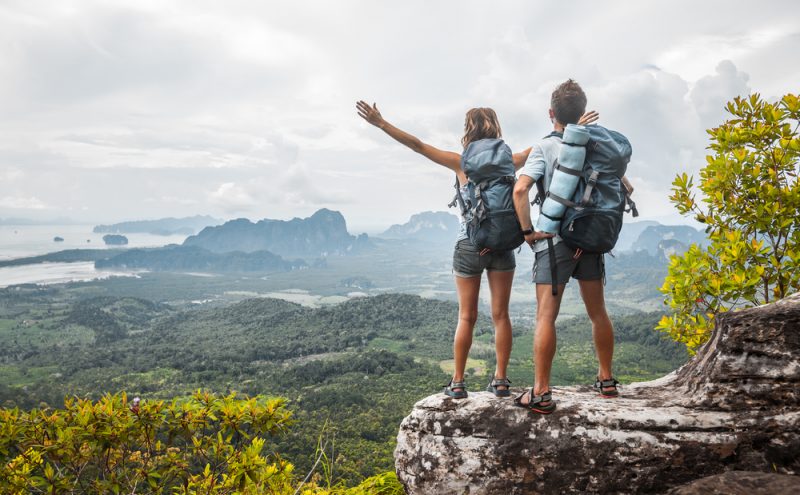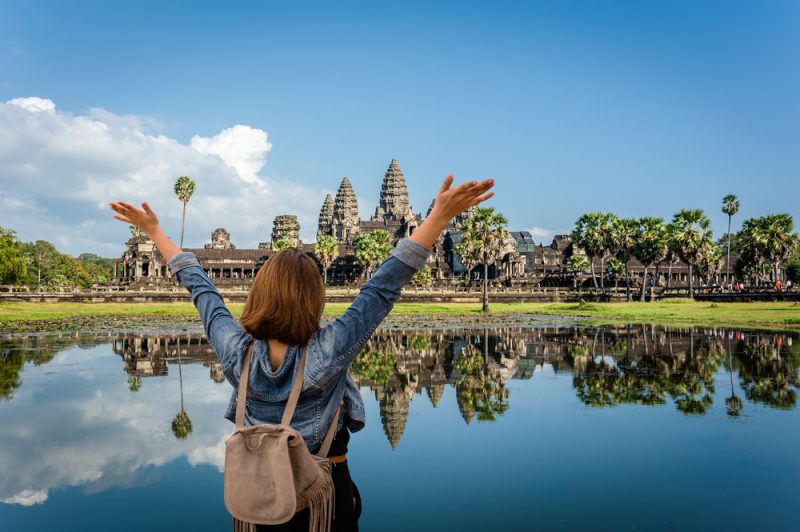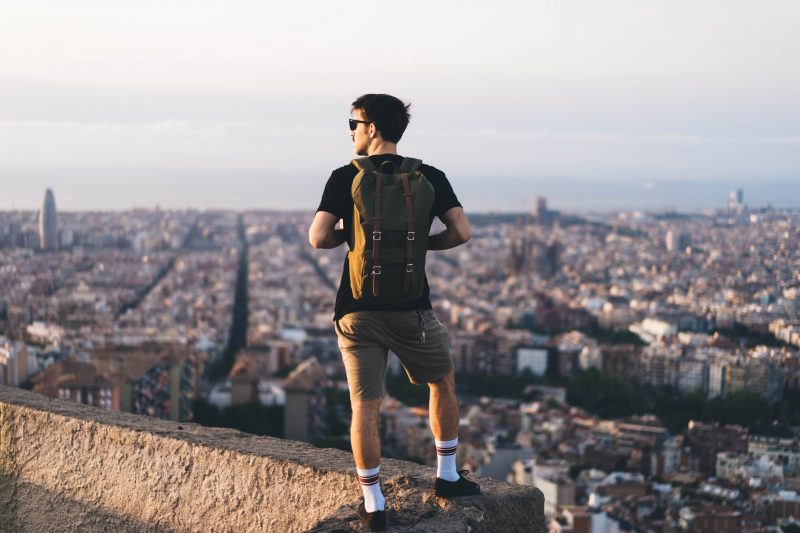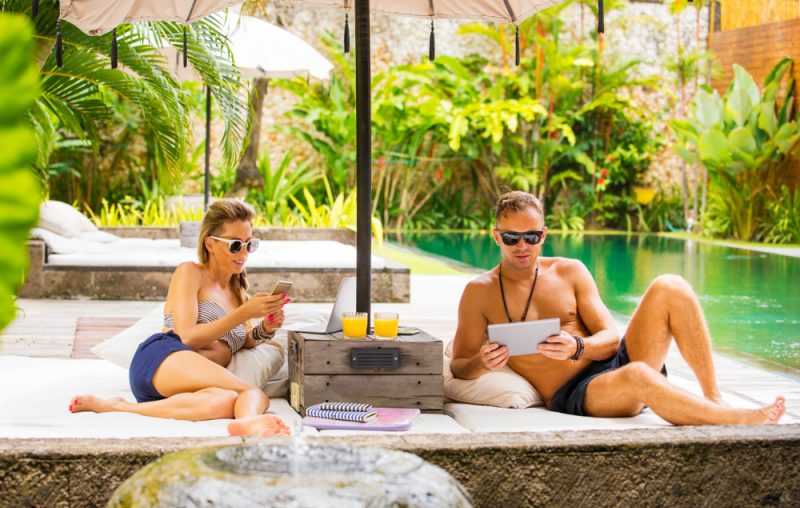Tips & Tricks For Budget Backpacking (in Style) Through Emerging Countries
Signing up for credit cards through partner links earns us a commission. Terms apply to the offers listed on this page. Here’s our full advertising policy: How we make money.
INSIDER SECRET: Planning ahead, choosing your destination wisely and using your points for splurges can help you backpack on a budget while still having some luxury moments.You don’t have to be a recent college graduate or student to take a budget backpacking trip. Backpacking can be done at any age, by anyone, even families. It represents a special type of travel freedom — knowing that everything you need is right on your back.
Backpacking may bring to mind images of crowded hostels and crammed buses, but it doesn’t have to be that way. I’ve carried my backpack from hostels to luxury hotels, from trains and tuk tuks onto business-class flights. These tips and tricks will help prepare you for backpacking through emerging countries — living the champagne life on a beer budget.

Get vaccines and travel insurance
Getting the proper vaccines, medication and travel insurance are must-dos before backpacking in emerging countries. Not only can this save you major hassle (getting malaria can really ruin a trip), but it will also save you a lot of money if you need medical care while traveling. Something as small as an ear infection from snorkeling can become serious and very expensive if left untreated; travel insurance will also save you the headache of wondering how much money a trip to the emergency room in a foreign country will set you back.
Choose your destination wisely
If you have a tight budget, backpacking through Cambodia or Guatemala is much more affordable than Iceland, France or Japan. Picking a destination where your money goes further will ensure you have a more luxurious experience. And it’s not just about stretching your dollars — make those points and miles go further too. Points hotels in emerging countries often charge less for an award night than in other countries. For example, the Le Meridien N’Fis in Marrakech, Morroco charges just 12,500 Marriott points per night. Meanwhile, the Le Meridien Etoile in Paris charges 35,000 points for an award night.
Ask around to find out which countries are cheap, safe and easy to backpack in. One of the most common backpacker destinations is Southeast Asia. If you end up in a place where many other backpackers are also traveling, you may make friends and continue your travels in a group, allowing you to stay more cost-effectively.

Use your points for airfare and splurges
Staying in modest B&Bs may be the best game plan if you’re backpacking for weeks, months or even indefinitely. You may even be able to stay in private rooms for under $15 per night in places like India or Sri Lanka. And once there, flying short-haul may be easy and cheap on low-cost carriers. So using your points for long-haul airfare or the occasional splurge may be the best use of them. Airfare, even in economy, can often be the most expensive part of a trip to an emerging country, so use your points for plane tickets, which cost significantly more than a budget inn. Or use them to splurge on a hotel after you’ve spent time camping or staying somewhere cheaper.
A few years back, I spent several days exploring the Bornean jungle in Malaysia. After sleeping in open-air cabins in the rainforest, on boats and in tents, I used my points to stay at the Four Points Sheraton Sandakan (at the time, the property cost 2,000 Starpoints per night). A Four Points Sheraton property may seem far from ultra-luxurious, but the comfortable bed, sea views and steaming hot shower were absolute heaven after sleeping among jungle creatures and bathing in crocodile-infested rivers. To this date, I still consider it one of my most valuable point redemptions.
Plan ahead
One of the best parts about backpacking is the freedom to go, do and see whatever you want, whenever you want. We don’t insist that you organize every detail ahead of time, but doing your research is important. Consider booking plane tickets further in advance for the best cash rates and setting Expert Flyer alerts for award availability. If you’re visiting somewhere during high season or while a big event or festival is happening, consider booking hotels in advance too.
For example, if you plan to be on the Thai island Koh Phangan during the (in)famous Full Moon Party, don’t put off finding your accommodations until the last minute. You’ll end up paying way more because of high occupancy, or worse, you could end up sleeping on the beach because everything is full.
Knowing your destination is half the battle. Researching where to dine, drink and tour is key for saving money while still having memorable experiences. Look into free walking tours and ask locals where they like to eat and drink. If you’re staying somewhere with a kitchen, you can also save money by shopping at the closest local grocery store to stock up on snacks, water or items to cook with.
Don’t overpack
The whole point of traveling with a backpack is being able to comfortably carry everything on you — the key word here being “comfortably.” When I packed for my first backpacking trip, I made the classic error of packing so much I couldn’t even lift my backpack onto my back. I had to start over until it was at a reasonable weight. Remember, you can probably do laundry wherever you’re going and buy things like clothes at your destination if you need to. So pack light for ease — and to avoid excess baggage fees at the airport. Many a backpacker has learned the hard way that AirAsia’s carry-on baggage allowance weight is capped at 7 kg, about 15 lbs., so check with your chosen airlines, especially ones you may not be as familiar with before flying (or even packing).
But take all the essentials
There are some essential things that may be more difficult to get in emerging countries, or they may be very expensive:
- A first-aid kit with stomach medicine, bug repellent (especially in malaria zones), over-the-counter pain relievers, bandages/bandaids, allergy medicine, feminine hygiene products, anti-itch cream, sanitizer and disinfectant, as well as any personal medication you take on a regular basis.
- A microfiber beach towel
- A large, lightweight scarf (which can double as many other things, like a blanket or beach towel, in a pinch)
- Clothing items that dry quickly
- Clothing items with secret pockets for storage
- Inflatable neck pillow
- Eyemask and earplugs
- Rain gear if applicable, including a rain cover for your backpack
- Comfortable walking shoes
It also goes without saying that investing in a good backpack is worth the money, especially if you’ll be traveling for a while. Trips to the chiropractor are pricey, and it’s important to have a backpack with material that won’t make you sweat with comfortable, padded straps. If it comes with a lock, that’s a plus too.

Read reviews
Reading reviews of hotels, hostels, rentals and homestays can help you choose the right spot when you’re on a tight budget. Some should be taken with a grain of salt. One important takeaway for backpackers, especially when traveling alone, is safety. Hygiene and cleanliness also rank high. Having accommodations that are safe, clean and comfortable will make your travels much more enjoyable. If you find reviews useful, make sure to go full circle and write your own to help other travelers.
Watch out for scams and protect your belongings
People often target backpackers for scams, so do your homework and read up on travel scams that may be prevalent in the region you’re traveling to. Keep your belongings safe and close to you at all times and use a lock for your backpack. Even though you may be staying in budget accommodations, try to find spots that offer an in-room safe. For a list of things to pack to your belongings and yourself safe, read this post.
Have cash
While we’re all about using credit cards here at Million Mile Secrets, having cash on hand is important in emerging countries where many vendors, restaurants, drivers or guides may not accept cards. Follow these tips when carrying and using cash in an emerging country:
- Research where the best place is to change money or if it’s better to take cash out of an ATM.
- Store cash in different places in case it gets lost or stolen.
- Have small bills on hand — one of the most typical scams is to tell visitors there’s no change available for large bills. You may want to leave small tips in local currency too.
- Bring a small amount of US dollars with you. If the machine eats your ATM card, you can at least change your cash for local currency.
- Ask friends and family if they have any of the currency you need before you travel.
Eat local cuisine
It’s much cheaper in foreign countries to eat whatever the locals are eating. For example, in Thailand, you’ll pay up to five times as much for a hamburger or pizza than you would for a Panang curry or chicken with rice. So dive into the local cuisine — you’ll probably find you love it anyway. And, be careful with booze. Not only is it costly to buy lots of alcohol, but you may want to have a clear head, especially when backpacking alone.
Buy a Local SIM Card and Use Apps
Buying a local SIM card or checking with your cell phone provider to purchase an affordable international plan before traveling will help you avoid costly roaming charges. Local SIM cards can often be purchased cheaply at the airport or in convenience stores in your destination. Once connected, you’ll have access to all those useful travel apps such as currency converters, navigation/maps, hotel and flight booking services, language translation and more. You may not be able to count on speedy Wi-Fi in emerging countries either, so being able to stay connected with a local SIM or data plan can really come in handy.

Editorial Note: We're the Million Mile Secrets team. And we're proud of our content, opinions and analysis, and of our reader's comments. These haven’t been reviewed, approved or endorsed by any of the airlines, hotels, or credit card issuers which we often write about. And that’s just how we like it! :)






Join the Discussion!